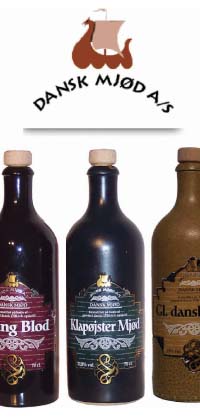
Mead is probably the oldest known alcoholic beverage in the world. From Europe to Australia, mead has been a popular drink dating back to long before Viking Times. One of the earliest references to mead can be found in the Indian Hindu's holy books, the Veda books, which date back 4000 years and possibly even earlier than that.
The oldest known recipe for mead to be written down in the Nordic countries was in 1520 by the Archbishop Olaus Magnus. The recipe comprised of water, honey, hops and brewers yeast, and concludes that "on the eight day - or earlier in emergencies - the mead may be drunk, but the longer it is left, the purer, better and healthier it will be."
Our products are brewed based on a recipe from about year 1700, and the ingredients are pure and 100% natural - guaranteed free from additives of any kind. Honey is the major and most important item in the recipe. Dansk Mjod A/S is Scandinavia's largest meadery; products include many varieties of mead, grappa, spirits, sparkling wine, mustard, jam, chocolate, and sweets.
The Mythology of Mead
Mead was also a drink for the gods, not surprising when you've tasted great mead! According to legend Suttung mead Odin won the first mead from the Giants. It was brewed from honey and the wise Kvasir blood; therefore it provided the drinker with supernatural ability (among other things being superior in Skaldic poetry).
Once the gods had mead in their possession, they coped with future mead-brewing by getting it from the goat Heidrun, who stood on the roof and ate the leaves of the branches from the tree lærad and its udder provided every day a whole bowl of mead.
That mead was a very esteemed drink can not be doubted. The poems in the Elder Edda show that mead was available to gods and humans all the time. It must be assumed that, despite this, mead was a rather rare drink, which mainly could be had by the rich.
History in the North
It was not until the Middle Ages that beekeeping came to the North. Until then, you had to get honey from wild bees. When honey was virtually the only sweetener that existed, it is assumed that only very rarely was honey so available that you could afford to use it to mead brewing.
The introduction of apiculture gave the mead a big upswing. Now, all could get it, and the mead heyday in the north was therefore in the Middle Ages. One drank it in many ways; best was when it was drunk straight, but it was also widely used mixed in beer.
As brandy arrived in the late Middle Ages, it was also widely used to mix with the mead. This practice continued right up to the 20th century, and it was so widespread that the drink had regional names.
Throughout history, mead always has been attributed to healing effects. Thus, created in 1666, was a scientific treatise by Thomas Bartholin after which mead was proven effective against rygve. In more recent times, talking about mead healing properties, in the book Honey and Your Health:
One need not go so far back in time to hear about honey importance for a long life. The Soviet authorities also declared not so long ago that nearly all of the 200 people who were proven to be between 110 and 150 years old, were (or had been) beekeepers and ate a good portion of their own product.
Mead was for centuries considered as a veritable lifesaver. Its main medicinal value is in terms of kidney disease, without adverse effects on the kidneys. With regard to arthritis and rheumatism, mead was not only a curative, but also a preventative medicine. It was widely used as a good digestive and laxative.
There are numerous other writings that tell about mead medical properties; almost all can be traced to honey, which is one of the healthiest natural products found. It has also always been a given that honey products gave a long life.
When the Romans conquered England, they discovered that they had captured "honeywine" and Plutarch was amazed at indigenous health & energy, and wrote: Such Britons just beginning to become old when they reach the 120 years. One should probably not argue that their secret was honey, but it is true that Pliny the Elder wrote: These islanders consume large quantities of honey-brew.
|

|
| Picture: Viking Blod, Klapojster Mjod, GI Dansk Mjod |
|

